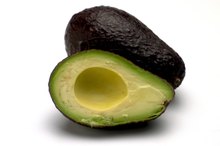Are Pomegranates Good for Children?
The pomegranate is a fruit that is often known as a “superfood” thanks to its high antioxidant content. Originally native to Iran, the fruit is similar in dimension to a medium-sized orange, but has reddish-pink, leathery skin. Inside the pomegranate are hundreds of small translucent sacs, which are also called seeds, filled with red, or sometimes pink, juice. These sacs are the only edible part of the pomegranate. Given a pomegranate's highly healthful properties and low calories, you should aim to include the fruit in your child’s diet. Most kids will be attracted by the bright color of the seeds and enjoy their sweet-tart taste.
Nutrition
Pomegranates are rich in vitamins and minerals, particularly vitamins C and E. These two vitamins are powerful antioxidants that help expel free radicals, unstable oxygen molecules that attack healthy tissues, from the body. The fruit is also high in fiber, potassium, iron and folate, a water-soluble B-complex vitamin.
Benefits
Can You Eat Acorn Squash Seeds?
Learn More
The high nutritional content in pomegranates gives numerous health benefits to the consumer. The antioxidants in pomegranates may help prevent a variety of diseases and illnesses, including cardiovascular disease, cancer and high blood pressure. In addition, the B-vitamin folate in pomegranates aids the healthy growth of red blood cells and promotes good blood circulation.
Uses
You can offer pomegranate seeds to your kids in a number of ways. Sprinkle the seeds over yogurt or in a salad, for extra flavor or crunch. You can also make pomegranate juice by crushing a cup or two of the seeds in a blender, and then straining the resulting juice with cheesecloth. They can drink the juice straight or you can include it in a fruit smoothie. You can also give them the seeds plain -- in a bowl with a spoon. Little kids may enjoy eating the seeds as they pick them from the fruit with their fingers. Just be sure to dress them appropriately: pomegranate juice stains.
- You can offer pomegranate seeds to your kids in a number of ways.
- They can drink the juice straight or you can include it in a fruit smoothie.
Removing the Seeds
Can Kids Eat Goji Berries?
Learn More
Removing the seeds from pomegranates doesn’t have to be a messy, frustrating experience. The California Pomegranate Council recommends cutting the crown off of the pomegranate, slicing the fruit into sections, then submerging the sections in a bowl of water. With your fingers, roll the seeds from the fleshy interior. Scoop up the seeds from the water with a slotted spoon or strainer, and they’re ready to eat.
- Removing the seeds from pomegranates doesn’t have to be a messy, frustrating experience.
- With your fingers, roll the seeds from the fleshy interior.
Related Articles
References
- U.S. National Library of Medicine: Folic Acid
- Pomegranate, raw. FoodData Central. U.S. Department of Agriculture. Published April 1, 2019.
- Pomegranate juice, 100%. FoodData Central. U.S. Department of Agriculture. Published April 1, 2019.
- National Institutes of Health Office of Dietary Supplements. Vitamin C fact sheet for health professionals. Updated February 27, 2020.
- Puneeth HR, Chandra SSP. A review on potential therapeutic properties of Pomegranate (Punica granatum L.). Plant Sci Today. 2020;7(1):9-16.doi:10.14719/pst.2020.7.1.619
- Sahebkar A, Ferri C, Giorgini P, Bo S, Nachtigal P, Grassi D. Effects of pomegranate juice on blood pressure: A systematic review and meta-analysis of randomized controlled trials. Pharmacol Res. 2017;115:149-161. doi:10.1016/j.phrs.2016.11.018
- Ammar A, Turki M, Chtourou H, et al. Pomegranate supplementation accelerates recovery of muscle damage and soreness and inflammatory markers after a weightlifting training session. PLoS ONE. 2016;11(10):e0160305. doi:10.1371/journal.pone.0160305
- Macchia L, Giliberti LA et al. Allergy to pomegranate and artichoke, novel food allergens of the Mediterranean diet. Clin Transl Allergy. 2013;3(Suppl 3):P75. doi:10.1186/2045-7022-3-s3-p75
- NIH Office of Dietary Supplements. Vitamin K.
- The Spruce Eats. How to Make the Most of Pomegranates During Their Peak Season.
Writer Bio
Barbara Diggs is a freelance writer living in France. A former corporate lawyer, she has been writing professionally since 2006. She has been published in numerous print and online magazines, specializing in travel, parenting, history and law. Diggs is a graduate of Wesleyan University and Stanford Law School.









